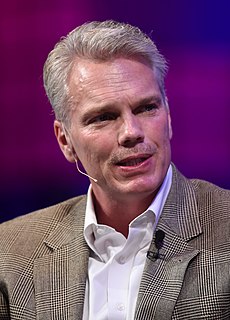A Quote by Tony Fadell
Thermostats are made by very large companies with no incentive to innovate. Their customers are contractors or HVAC wholesalers, not consumers. So why spend to make them better? It's a good business.
Related Quotes
There are companies that are good at improving what they're already doing. There are companies that are good at extending what they're doing. And finally there are companies that are good at innovation. Every large company has to be able to do all three - improve, extend, and innovate - simultaneously.
One of the best ways to make growth personal is to give employees a share in their firm, a real incentive to go the extra mile, more of a 'John Lewis Economy' if you like...We know that firms where employees are engaged and own a stake do at least as well as other companies in the good times and have performed even better in recent bad times. Expanding and recruiting at a much faster rate and achieving better productivity...So, why do they make up just 2% of our business landscape?
People believe that companies have always had strategies, dating back at least to likes of Henry Ford or Andrew Carnegie, maybe to the contractors who built the Pyramids. As it turns out, it was only in the 1960s and 1970s that a new breed of "business intellectuals" began to develop the intellectual framework that allowed companies to look at the three "C's" of any good strategy - namely their costs, customers, and competitors - in an integrated way.
The profitable part of the online business is very likely several years away. Entering the business because it's the hot topic of the day doesn't make a profitable business nor satisfied customers. That's why it will be a part of Nintendo's strategy, not the mainstay, as other companies are attempting to do. There still are too many barriers for any company to greatly depend on it.
The reason why it is so difficult for existing firms to capitalize on disruptive innovations is that their processes and their business model that make them good at the existing business actually make them bad at competing for the disruption. Companies in fact are specifically organized to under-invest in disruptive innovations! This is one reason why we often suggest that companies set up separate teams or groups to commercialize disruptive innovations. When disruptive innovations have to fight with other innovations for resources, they tend to lose out.
Why is Caterpillar bad if we create a new job in India or China to receive U.S. exports? It makes no sense to me. We want to drive all the exports we can from the United States. We want to concentrate on all those consumers, outside contractors, customers outside the United States that we possibly can.




































